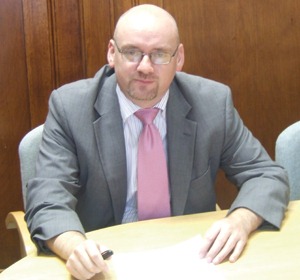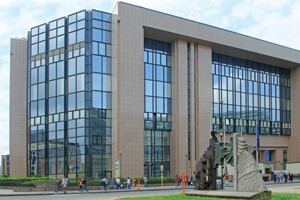John McCarthy: European priorities
 John McCarthy discusses the environmental issues likely to impact on Ireland’s presidency of the Council of the European Union in 2013 and other key environmental policy priorities with Owen McQuade.
John McCarthy discusses the environmental issues likely to impact on Ireland’s presidency of the Council of the European Union in 2013 and other key environmental policy priorities with Owen McQuade.
Compliance in transposing and implementing European environmental law has seen a step change over the past two years. The level of infringements gives a “barometer of performance in this area”, according to John McCarthy, Assistant Secretary of the Department of Environment, Community and Local Government’s Environment Division.
In the two years to the end of 2011 the number of outstanding environmental infringement cases involving Ireland will have halved from 32 to 16: “We are confident of continued progress in
2012 and we have a good working relationship with the Commission.”
“Although some remaining issues are significant and difficult, such as septic tanks and turf cutting,” adds McCarthy.
Ireland is moving from the lower half on an infringement table of member states to around mid-way and should move into the better performing half in 2012.
McCarthy acknowledges that infringements may not be wholly adequate as a proxy for performance as they depend on the performance of reporting systems and levels of enforcement across member states. Improved systems and enforcement is better dealt with at member state level with the Commission ensuring adequate and compatible datasets in order to compare performance.
Presidency
Ireland will take up the six-month Presidency of the EU at the start of 2013 for the seventh time, the last being in 2004.
McCarthy says this is “a huge endeavour for any member state, with big issues across a number of government departments including DECLG”.
With over 12 months to go, the department is already 18 months into its planning for the presidency. McCarthy also sees it as a “great opportunity, not just engaging with other EU member states but also on the wider international stage. It will be a very significant workload for departments and agencies and the system is absolutely intent on delivering.”
There will be several major environmental initiatives during the Irish presidency. The first of these is the Seventh EU Environmental Action Plan, a “strategic piece” which will outline priorities for the next 5-10 years and “offers the opportunity to leave a lasting Irish imprint” on EU environmental policy.
Other areas include an initiative on EU environmental law implementation. Water will come to the fore during this period also, with a ‘Blueprint for Water’ expected in late 2012. International chemicals management should see the first internationally binding agreement on mercury finalised during the Irish presidency. In addition, biodiversity, the low carbon roadmap to 2050, the extension of the EU Emissions Trading Scheme to new sectors (including the maritime sector) and the broader international climate agenda are also expected to be significant presidency agendas.
On international climate policy, the Kyoto period will expire at the end of 2012. The next stage of the international negotiation process, to get a successor for Kyoto, will take place in Durban at the end of this year. It is doubtful that a new agreement will be agreed in 2012 and McCarthy foresees a transition phase from 2013 to the date of any new agreement, which could well entail a lot of technical work during the Irish presidency. In preparation for Durban, the EU has signalled its “openness” to a second commitment period, but has set out the associated conditions it wishes to see satisfied.
On domestic climate policy, a review of progress announced by Minister Phil Hogan will be published shortly. McCarthy believes that the purpose of the review has been misunderstood by some commentators: “This review has been a stock-taking exercise, an assessment of ‘where we are’ versus our Kyoto targets and the targets under the EU Climate and Energy Package to
2020. It will provide the platform for a debate, with full public consultation, on how to move forward with the further steps required to meet the trajectory of targets from 2013 to 2020, and to position ourselves on the medium to longer term path to a low carbon economy.
This eye to the medium to longer term is important so that informed “carbon-relevant” decisions are made. McCarthy sees this as being particularly critical “given that investment decisions have a 20-25 year payback, we need to avoid locking into the wrong technologies and position ourselves instead to seize opportunities associated with the green economy.” The Programme for Government also includes a commitment for climate legislation and the aim will be to take this forward in a way that supports the policy development process.
Waste
There have been two recent periods of consultation on waste: one on general waste policy and one on household collection. A new waste policy will be published by the end of 2011 and the key principles will be “to minimise waste, maximise the value from any waste that does arise, and get the best environmental outcomes.” Essentially, the new policy will be designed to “push the focus higher up the waste hierarchy.” McCarthy observes that with waste, Ireland is now in a much better position than some years ago. Waste was previously top of the list when the European Commission met with Irish officials to review overall environmental performance, whereas now it is much further down the list. Progress has been made on a number of fronts, including significant diversion of waste from landfill and an innovative waste prevention programme which has been in place since 2004. Of course, challenges remain, not least the achievement of EU targets for diversion of biodegradable waste from landfill in 2010, 2013 and 2016. The
2010 waste figures will be released by the end of this year in the EPA’s 2010 National Waste Report and McCarthy expects Ireland to meet the 2010 target. The new policy framework to be finalised by end-2011 will support the further effort required to achieve the targets for 2013 and 2016.
Profile
John McCarthy has been Assistant Secretary, Environment Division, at the Department of the Environment, Community and Local Government since February 2010. Prior to this he was Assistant Secretary in charge of the department’s Housing Division. He previously served as Principal Officer in a number of the department’s areas of activity, including affordable housing and waste management. He has worked in the department since 1991, having previously worked in a number of other departments, including the Department of Social protection and the Central Statistics Office.






